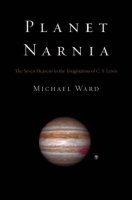 Planet Narnia: The Seven Heavens in the Imagination of C. S. Lewis, by Michael Ward (Oxford University Press, 2008)
Planet Narnia: The Seven Heavens in the Imagination of C. S. Lewis, by Michael Ward (Oxford University Press, 2008)
It is hard to overstate the excitement with which I read Planet Narnia. I'll return shortly to Michael Ward's discovery of the pattern and scheme under which C. S. Lewis wrote all seven of his Narnia books, but it's also worth noting that Ward's writing itself was a delight to read. I am so very, very tired of the recent trend of informal, conversational writing that appears to have been put together in haste, without benefit of editor or even proofreader. That style is good for blogs, but in a book the lack of consideration for sentence and paragraph structure, the grammatical mistakes, the impoverished vocabulary, and what often comes across as a condescending tone detract significantly from the message proclaimed.
Planet Narnia is a cool stream dancing through a thirsty land. It is intellectual and academic without being in the least bit dry, a book clearly written for the general public—but an intelligent and educated general public. It was not, perhaps, the best of books to take to the shore where one is constantly in (delightful) danger of being interrupted by friends who drop by or grandchildren who want to play, but it was too fascinating to give up for lighter fare, and will well bear re-reading, probably several times.
As soon as I heard about Ward's identification of the relationship between the Narnia books and medieval cosmology, I knew I had to rush right out and buy the book. (Note: "rush right out and buy" is used in the same sense as "dial a phone number." What I actually did was order it from Amazon. To be fair, I did try first to get it from our library or a local bookstore, but without success. I want to support local businesses, but what can I do if they so rarely have what I want to buy?) If you are not as impatient as I was, you can get a preview at the Planet Narnia website.
(In case anyone is confused, I should probably note that Lewis's use of this cosmology has nothing to do with believing in a geocentric universe, but rather its symbolic and philosophical meanings. As Aslan explains, in The Voyage of the Dawn Treader, "a huge ball of flaming gas" is not "what a star is, but only what it is made of.")
A little background will help explain one reason I was so excited about Ward's ideas. I have not (yet) read Dante's Divine Comedy, but Porter is in the middle of Purgatorio, having finished Inferno a while back, so for his birthday or some such occasion I bought the Teaching Company lectures on the Commedia. This is a course I recommend very highly for anyone contemplating reading Dante's masterpiece. I had no idea what an absolute genius Dante was! While listening to the lectures, I was struck repeatedly by how much parts of the Divine Comedy reminded me of the writings of C. S. Lewis. Planet Narnia showed me why this is no coincidence: Lewis was a great admirer of Dante, and much that is in Dante's great poem, particularly the Paradiso, is reflected in Lewis's works.
Although I've always loved to read, I never liked literature classes in school, despising the way teachers would take what otherwise might have been an interesting book and analyze it to death; I see now that my distain developed because I had never seen such analysis done right. Both the Teaching Company lectures and Planet Narnia showed me that the right analysis of the right book is like solving an enormous cryptic crossword puzzle.
Ward's work also helped me understand one reason I've been so disappointed by the movie versions of The Lord of the Rings and the Narnia books (so far). Even where they are true to the characters and plot of the stories, even where they have caught some of the ideas conveyed by the books, they have largely missed what Lewis called the "Kappa element"—roughly, the atmosphere, flavor, or tone—that makes each book what it is.
Is an understanding of medieval cosmology, or the way it infuses the Narnia tales, necessary for appreciating the books? Of course not; they have been well loved ever since they were written, by people who, like me, had no clue that all the references to gold in The Voyage of the Dawn Treader were part of its "Solar" flavor. The Kappa element was apparently intended not to be seen (except by puzzle solvers), being much less obvious than the Christian element, which Lewis states he deliberately kept low-key. Its importance is on the imaginative, not the rational level.
The distinctive roles of the imaginative and the rational are expressed much more clearly in Planet Narnia than I was able to articulate in a recent, frustrating discussion with a friend, and thus particularly welcome reading. Although Truth is one and undivided, we cannot see it correctly if we do not look at it through both lenses. I doubt that C. S. Lewis ever used the terms "left brain" and "right brain," but he would have appreciated the value of both approaches.
Enjoy the Narnia tales just as they are, if you wish. You don't need to know the Jovial elements in The Lion, the Witch, and the Wardrobe, nor how Mercury influences The Horse and His Boy. But rest assured that J. R. R. Tolkien was wrong in considering the Narnia septet to be a literary hodge-podge. Planet Narnia makes a convincing argument that the apparently random elements are instead carefully placed stones in a brilliant mosaic.


